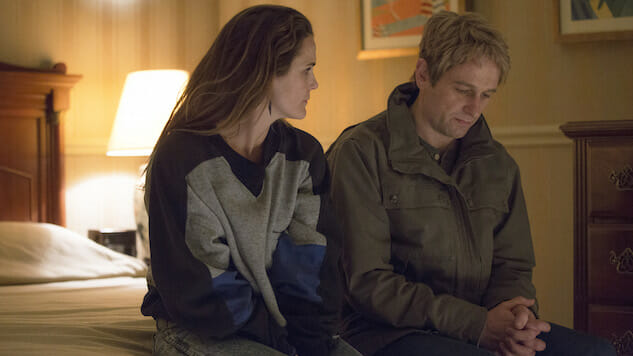With “Harvest,” The Americans Enters the Conversation for Best Final Season of All Time
(Episode 6.07)
Photo: Eric Liebowitz/FX
As you sow, so shall you reap: The phrase that concludes my review of “Rififi” is both the premise of “Harvest”—with its near-Biblical violence, its hideous reckonings—and its main mechanism, the self-referential gesture of its defining montage. Creeping through the Jennings’ home as Philip (Matthew Rhys) and Elizabeth (Keri Russell) make their way back from Chicago, Stan Beeman (Noah Emmerich, the episode’s center of gravity) pauses on a family photograph, and flashes back to Season Four: To William, in the throes of Lassa fever, describing his KGB colleagues as “Couple kids. American dream.” In Paige’s (Holly Taylor) bedroom, his hand brushes the cross she once wore around her neck, and I found myself in the midst of a flashback: To the third season’s “Born Again,” with Paige’s baptism in her newfound faith, or perhaps the fifth’s “The World Council of Churches,” when she ultimately abandons it. Before Stan departs, he even searches the Jennings’ garage again, as in the pilot episode: Here, The Americans’ most important harvest is of the seeds planted across the series’ evolution, as if to say to the doubters, “Our long con paid off.”
In fact, from the moment Philip stashes Henry (Keidrich Sellati) at the neighbors’ again, “Harvest” near about bursts with flickers from the series’ past. Some are humorous: Stan, after being duped by Philip for the lion’s share of the Reagan administration, declares that he’s good at “knowing when somebody’s not telling me something.” Others are obscure: “Aunt Helen” is another “illegal,” one Elizabeth used as cover for her medical treatment after Stan shot her in “The Colonel.” Still others are heartrending: In the episode’s mournful conclusion, as Philip reels from the failed attempt to extract Harvest, he recalls his Russian Orthodox marriage in “Darkroom,” a moment of hope before it all fell apart. That these deep cuts from the catalogue never read as fan service is among the highest tributes to the series’ construction: The Americans’ moments of truth—though often as shocking, in the particulars, as the dismemberment by fire axe of a woman’s corpse—have always been the result of patience, not provocation. The hand Elizabeth places on her husband’s cheek as she heads off to work again, and thence to shape their daughter in her own image, is six seasons in the making, and it contains the combined force of every minute.
In this sense, the series’ rhythms are reflective of life’s. Our hideous reckonings may not feature dead FBI agents and bullet-pocked vans, but in the end, no different are the regrets we cling to, the grudges we nurture, the resentments we embrace. After all, before he submits to that straining, choking, red-faced suicide, the man code-named Harvest leaves three messages with Philip: One for his mother (“I never forgot what you did for me.”), one for his father (“I hope you die the miserable death you deserve.”), and one for his state. It’s this belief that affection and abhorrence operate by the additive property that allows The Americans to hang its latest masterpiece on a handful of long, lingering glances, on unspoken pleas and unbroken silences, on all the inferences and innuendoes, suppositions and suspicions, that comprise our most disfigured relationships: Whether it’s Stan’s expression as Philip departs for Chicago, or Philip’s as Elizabeth weights down and discards their fellow agent’s remains, or Elizabeth’s as Paige reveals that she fears nothing, not even dying, more than being alone, “Harvest” is a potent reminder that the scriptural passage from which its clarion call comes is not about the consequences of lying, but of finally learning the truth. “Be not deceived; God is not mocked,” Paul promises in his epistle to the Galatians. “For whatsoever a man soweth, that shall he also reap.”
Be not deceived. So it is that Stan (“when are we getting sketches?”) begins to sniff out the truth about the nice couple across the street. That Erica (Miriam Shor) refuses the cloudy comforts of morphine so she can continue her work. That Elizabeth leaves Philip again, still dead set on the summit; that Paige offers lifelong commitment to her mother’s cause, beginning with a State Department internship; that Henry matter-of-factly admits he’s never been his parents’ first priority. Three episodes from the series’ conclusion, this dropping of the veil—this emphasis, per Erica, on seeing clearly—has brought The Americans to its most consequential moment, and in the midst of a final season that so far deserves consideration alongside Breaking Bad’s, The Sopranos’, and a handful of others’ as the medium’s all-time best.
Fitting, then, given its focus—its main mechanism—that “Harvest” should turn on what amounts to a battle hymn: Patti Smith’s solemn “Broken Flag.” It rises on the soundtrack as the camera soars over a chain-link fence, following Elizabeth as she tosses Marilyn’s head and hands into the water. “What will rend will also mend… And the dream she weaves will never end,” Smith sings, desolately, though of course it’s the lies we tell ourselves—Couple kids. American dream.—that reap the worst consequences.
Matt Brennan is the TV editor of Paste Magazine. He tweets about what he’s watching @thefilmgoer.







































